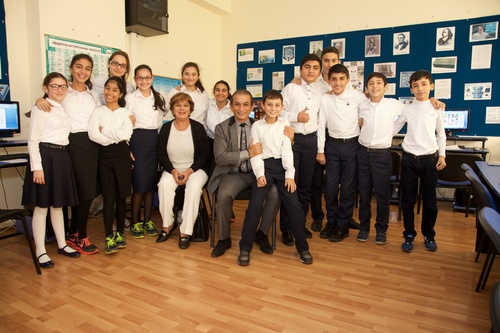At a time when thousands of Jews are fleeing rampant anti-Semitism in France, the United Kingdom, and other European countries, there is one country where “it’s becoming attractive even for some people to come back” from Israel and other countries to which they had previously emigrated. According to Rabbi Shneor Segal, the Israeli-born rabbi of The Jewish Community of European Jews in Baku, that country is Azerbaijan.
Located on the western shore of the Caspian Sea and bordered by Iran, Armenia, Georgia, and Russia, Azerbaijan has a Jewish community that traces its roots back some 2,000 years. Throughout that period—and even during the years from 1920 to 1991, when it was a part of the Soviet Union—Azerbaijan has prided itself on its tradition of tolerance and acceptance of minorities. Among the country’s population of 9 million, 95 percent are Muslim and about 12,000 residents are Jews.
As part of a recent delegation to Azerbaijan from Sinai Temple in Los Angeles, I visited six synagogues there, as well as a Jewish day school and Jewish Community Center. There were no police, private guards, or noticeable security measures at those sites, unlike a city such as Los Angeles and many European cities. Azeri Jews can also walk the streets wearing yarmulkes without fear of being harassed.
Azeri Jews participate fully in the social and economic life of the country without reference to their religion or ethnicity. Education is free from grade school through university, so individuals are limited only by ability and ambition. When our delegation asked the Hon. Tatiana Goldman, a Jewish member of the Azeri Supreme Court, about the effect of her Jewishness on her career and life, she replied, “I don’t even think about it. I think about my work.”
While church and state are separate in Azerbaijan, there are two government agencies—the Center for Multiculturalism, Interethnic and Religious Affairs and the State Committee for Work with Religious Organizations—under whose aegis the government dispenses major grants that cover most, if not all, the costs of building, maintaining, operating, and staffing synagogues, churches, mosques, religious schools, and institutions. Based on our observation, the government subsidies are quite generous since each of the synagogues we visited, whether in Baku or Quba, was beautiful—comfortably (or even luxuriously) furnished and decorated, and immaculately maintained.
The Chabad Or Avner Jewish Day School, located on a beautifully maintained park-like campus in a Baku suburb, on land donated by the government and built with the support of the Heyday Aliyev Foundation, is an exception when it comes to government support. According to Rabbi Segal, its operation is 100-percent supported by private funds. (During our visit, a Kurdish-Jewish merchant pledged $50,000.) The school has 200 students from kindergarten to 11th grade and 40 teachers on staff. It follows government rules regarding standards and curriculum but also includes English language and Hebrew language classes for all students and has a state-of-the-art computer lab. Segal said that “thanks to the Jewish school, more and more young people identify themselves as Jews and are becoming more active in Jewish life.”
In the mountains situated northwest of Baku—about two hours by bus or car on a modern highway—is the city of Quba, a section of which is known as the Red Village. It was founded 270 years ago by Jewish immigrants from Turkey and Iran. During the Soviet period it was known as Jew Village, given the fact that it has a Jewish population of some 4,000, thus making it one of the largest Jewish villages outside of Israel. The region in which Red Village is located is an ideal summer vacation destination where many “Moscow Jews” maintain luxurious summer homes, nearly doublingbles the Jewish population of the village. (“Moscow Jews” are Azeri-Jewish emigrants who established business and became wealthy in post-Soviet Russia.)
As pleasant and accepting as life is in Azerbaijan, the country nonetheless has its problems, especially where the elderly, the ill, and people with disabilities are concerned. Social services, whether governmental or connected to the Jewish community, do not fill all of the many needs. Dr. Larissa Reikhrudel, a Jewish pediatrician, decided to do something about this and founded the “Jewish Women of Azerbaijan Humanitarian Public Organization.” With private funding, mostly from oil companies, her organization provides a quasi “Meals on Wheels” service for the homebound elderly and has organized “dining clubs” for children and mothers in need, all without regard to religious affiliation. Reikhrudel, a petite and energetic woman, saw a need and filled it when the organized community lagged behind.
Amid the grim picture presented by international headlines these days, in particular last Friday’s Islamist terror attacks in Paris, the story of Azerbaijan offers a morale boost through the Muslim-majority nation’s unlikely status as a safe haven for Jews in a dangerous regional neighborhood.
By: Peter Rothholz
20.11.2015
majority-nations-culture-tolerance-jewish-world/#MUjBQhKY6hvRTRA8.99

